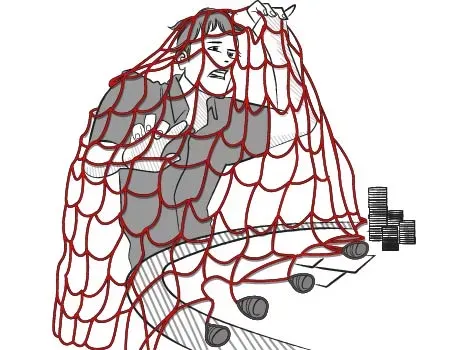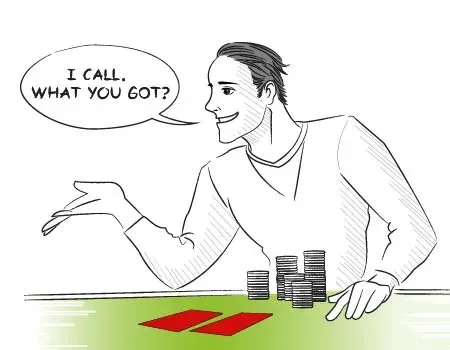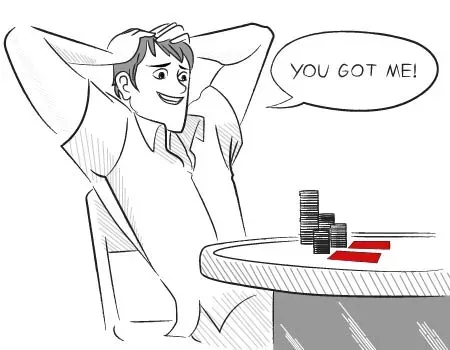BLUFF CATCHER - LEARNING TO CATCH BLUFFS
Throughout this eBook, we’ve elaborated in great detail on the concept of bluffing – both how to do it effectively and how to spot when others might be pulling a fast one on you!
In this section, we go over the art of catching bluffs. Becoming a Bluff Catcher will instil fear into the hearts of your opponents. It’s one thing to be able to spot a bluff, but what do you do once you realise you’re being bluffed? We will give you the tools to not only spot the bluff but catch the culprit red-handed.

However, as poker is a people game, occasionally the “human element” of it can still cause players to play and make decisions in seemingly unexplainableways.
For example, sometimes, players might do the following:
- Make a bet with no intention of doing it as a bluff or value. As a result, their bet may appear polarising (bluff or nuts) to a competent player, causing such regs to call with their “bluff catcher” type hands. At showdown, however, they find out their opponent was just randomly betting a hand that was marginally better than theirs (in a spot most people would’ve checked a hand of that strength).
- Call your bluffs in spots that are unimaginable, regardless of how you picked your spot perfectly and executed it with finesse. (i.e. players who check-call down 3 streets with an underpair for no seemingly good reason, other than being a calling station.)
As a result, it’s important to stress the point that the players you bluff should be competent enough in their poker abilities to have a general sense of what’s going on in a hand. They don’t have to be sharks or overly experienced, but just good enough to eliminate the “randomised” aspect some players have and make somewhat logical decisions with their gameplay decisions.
After a poker bluff is called (either you call someone else’s bet or they call your bluff), there are many post-hand implications that should be considered for future gameplay, on both accounts.
WHEN YOU CALL SOMEONE ELSE'S BLUFF
Your Bluff-Catching Abilities: When showing down the winner, regardless of
whether it’s on a bluff-catching hand or a normal hand, all the other
 players get to see your hand and then can review how the hand progressed to see if there was anything irregular, unusual or noteworthy about it. If there was something worth remembering, top players will note this down so they can use it against you in the future. For example, after you call someone weakly, certain players will notice now that you’re competent enough in some spots to make insane bluff catches. Thus, some players may tighten up their ranges against you and only play strong value hands against you from now on with the hopes you’ll try bluff catching them in later hands.
players get to see your hand and then can review how the hand progressed to see if there was anything irregular, unusual or noteworthy about it. If there was something worth remembering, top players will note this down so they can use it against you in the future. For example, after you call someone weakly, certain players will notice now that you’re competent enough in some spots to make insane bluff catches. Thus, some players may tighten up their ranges against you and only play strong value hands against you from now on with the hopes you’ll try bluff catching them in later hands.
- The Fact Your Opponent Can Bluff: Knowing your opponent has the capabilities of bluffing in certain spots can be of incredible value to you in future hands.
- How Weak Your Opponent Can Bluff: One of the lovely things about online poker on many sites is the fact that when a showdown is reached, the cards of all players who made it to showdown can be reviewed in the “Hand History” re-player of the poker client. By looking at this, you can see exactly how your opponent bluffed, and reassess his thought process and actions through each step of the hand.
|
NOTE: After calling another player in live play, the rules of showdown state that the last aggressor (or first to act in the betting round, if checked) must showdown their cards first. Therefore, if you call someone else’s bluff, wait until they flip over their cards first before you expose your winning hand. You will gain information about their play this way and can then backtrack through the hand, too, to see how they played their cards at each street. You’ll also be able to deduce some tendencies of your opponent and how some characteristics from that hand might carry over to future hands. |
- How Will Your Opponent Alter His Gameplay: Pay close attention to your villain in the hands immediately following the bluff. Is he on tilt and playing more aggressively? Is he still bluffing inexplicably, despite his new table image? Is he playing passively and loosely calling other’s bets now? Is he trying to win his lost money back? Is he adjusting and reverting back to a tighter image? Use this information to your advantage by counteracting it effectively.
- Stack Sizes: After a major pot (or even a minor one sometimes), analyse how the players’ new chip stack sizes might affect their decision-making in future hands, given table dynamics, game-flow, and typical play for that stack size. (E.g., Ever seen a tournament player go from 80bb to 20bb in a hand, go into desperation mode, and then shove all-in with almost any hand immediately after to try to get back to where he was?)
WHEN SOMEONE ELSE CALLS YOUR BLUFF:

|
- How Other Players Will React to Your New Table Image: Some players won’t be aware of how your gameplay may be affected after bluffing unsuccessfully. Others will know how such a situation will likely affect you. Some will constantly be reassessing in future hands how it actually will have affected you. Always remember the value of the metagame (“He knows that I know that he knows that I know”), and always strive to just be one step ahead of your opponent.
- Re-assess The Hand: This is your chance to learn from your mistakes. Was your opponent’s poker hand one that you put him on? Did your betting story make sense? Could you have played more optimally by betting more or less, or taking another course of action altogether on any of the betting streets?
- Re-assess The Opponent Who Called You: When your opponent shows down his winning hand, you can then re-trace the steps and learn more about his play and tendencies this way. Did he call you down inexplicably light? Did he play his hand in a tricky manner? Did he call your bluff for the second time in a session (meaning you may have a physical tell he could be using to his informational advantage)? Remember bluffs don’t have to work all the time to be profitable, but there is always information to be gained from every failed bluff you experience.
Ultimately, remember that poker is an ever-evolving game. Whether it’s from studying that you do on your own away from the table to the re-adjustments you continually make during a session, there’s always so much to learn from each hand situation. You can subsequently use that info for later hands.
